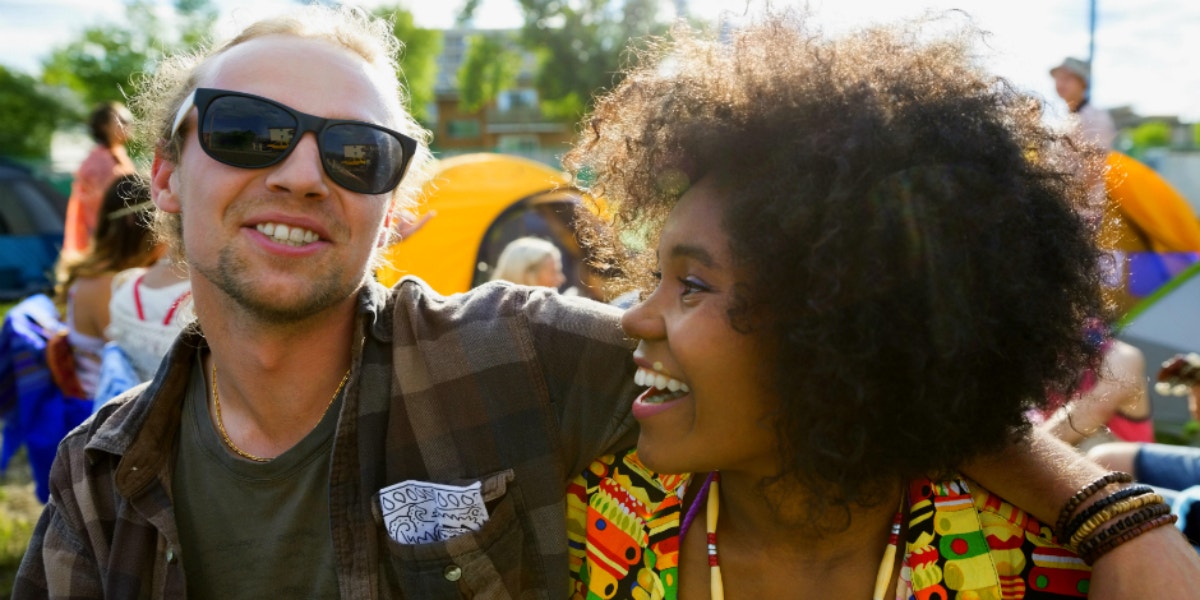How I Discuss Allyship In My Interracial Relationship
How can you become a true ally to your partner?
 Getty
Getty By Amanda Davis
I have been with my boyfriend for almost four years now. He's white and Indian, and I'm Black — but that's never gotten in the way before, because, of course, love.
Yes, we've had conversations about race and experienced the side-eyes from strangers in public, but we just enjoy being together, so the hard parts were worth it.
It wasn't until the current Black Lives Matter movement when we made it a priority to consistently discuss and examine how society treats us differently.
After the horrific deaths of Breonna Taylor, Ahmaud Arbery, and George Floyd, I shut down.
More Black women and men dead because of police brutality and systemic racism. The fears I had about being Black in America are now front and center in my head, every second of the day.
With things affecting me so deeply, I expected to see the same reaction from my partner.
When that wasn't the case, I knew we had to have an in-depth, open dialogue about how to be a supportive and effective (not just good) ally — something I believe is absolutely necessary in order to maintain a lasting, healthy interracial relationship in today's climate.
These are things we found most helpful when talking about race and being an ally to your Black romantic partner:
1. Don't avoid the situation.
The conversation on allyship was something I brought up after having pent-up frustration due to not talking about it at all.
During our talk, I learned that my partner was hurting and frustrated as well, but didn't want to put any more stress on me. He wanted to be "my safe space."
As much as I understand the intent in this, avoidance is absolutely not the answer. The racism, systematic oppression, and murders of Black people is something I have to live with and experience every day.
If a white or non-black person decides to be in a relationship with a Black person, they need to take on these issues as well. Not talking about it will only instill the habit of silence with other people, which will not help the cause or the fight for change.
2. Use your privilege.
The white or non-Black partner in the relationship has the opportunity to amplify Black voices in places that Black people cannot. Yes, protesting and signing petitions is great, but another thing you can do is talk to your family and friends.
Stop letting the racist relatives get away with their remarks, and stop staying silent after a friend says a racist joke. Use the privilege that comes with your skin color to hold others accountable and open their eyes to see that what they're doing is wrong.
Although people naturally want to be around like-minded people, the white partner has the opportunity to speak to those on the far right without being immediately shut down.
3. ...But be self-aware.
As a rule of thumb, the white or non-Black person in the relationship shouldn't get offended if called out by their partner for going over the line with this one.
Using your privilege and your voice is extremely helpful, but there is a certain point in the movement and the Black experience that you won't ever be able to understand.
It's important not to speak for Black people, but to amplify, share, and showcase what we say. Any other way comes off as a "white savior" complex, which is not an ally.
4. Be patient.
Right now, Black people are going through a lot physically and emotionally.
I had to learn that my immediate reaction of shutting down was okay. I have the right to react to the oppression of my community.
If your Black partner reacts angrily, that's okay, too.
The white/non-Black partner should simply make it clear that they care and are there with a shoulder to cry on. If your Black partner asks for space, grant them the time to feel and think, but make your intentions of love and support known.
5. Listen and learn.
Now is the time to dive into the literature, movies, shows, and other informational resources that talk about the Black experience, civil rights, and the systematic oppression that we've had to face. If your partner is like me, these things may spark an even bigger discussion about personal experiences or feelings toward it all.
And don't expect your partner to react this way with everyone.
You are their partner, so the dialogue will always be different with you. Your Black partner may not want the same open discussion with your friend or family member (it's exhausting), so listen to them!
Acknowledge what they're saying and feeling and know that you won't be able to fully relate — and that's okay. Having a partner who is willing to stand up and fight for our lives, willing to educate themselves, and provide love and support is what we need right now.
Remember that allyship is an active thing, not just a one-time acknowledgment.
Amanda Davis is a writer who focuses on relationships, love, and dating. For more of her relationship content, visit her author profile on PopSugar.

